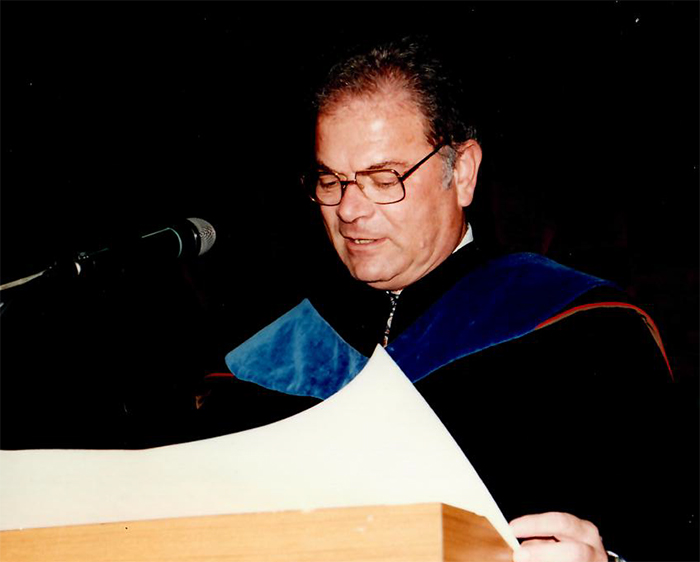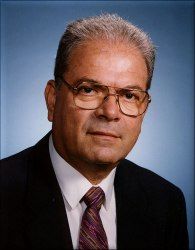Prof. Alexander Solan stood out at the Technion for his skills, from the moment he returned from his PhD studies in the United States until the last of the many management positions he held. His close friends enjoyed learning from his wealth of knowledge in music, culture, art, the world, and even culinary tastes
Alexander Solan was born in Warsaw in 1934, the only son of enginer Eliash and the grandson of Dr. Aharon Soloveitchik, a renowned physician and surgeon. As a teenager, Solan lived through the Holocaust and survived it together with his family. In 1945, the family immigrated to Israel and settled in Nesher, where his father served as a mechanical engineer at the Nesher cement factory.
After graduating from the Reali School in Haifa, Solan continued his studies at the Faculty of Mechanical Engineering at the Technion as part of his academic army reserve, graduating in 1957 with honors. “My father came from a family of outstanding students,” says his daughter Alona, adding, “He didn’t have any other option.”
During his military service as a mechanical engineer at the Nuclear Research Center, he completed his engineering degree and went on to earn his master’s degree in 1963. He completed his PhD at Brown University in the United States, graduating in 1966. He later received an appointment as a lecturer and research fellow in the Department of Engineering and Applied Physics at Harvard University. A year later, he returned to Israel as a member of the Faculty of Mechanical Engineering at the Technion, where he was senior lecturer.
“Alex returned to the Faculty from the United States together with the late Yeshayahu Winograd,” says his colleague Prof. Pinhas Bar-Yosef, adding, “the two joined forces and ‘dared’ to engage in water desalination, a field that was not considered classical mechanical engineering at the time. Even at Brown University, the two conducted research in areas that were beyond the classical boundaries of mechanical engineering. They came back with a broad vision and insights for the mechanical engineering profession.”
Rallied to the Cause
Their groundbreaking research did not last long. In 1973, after only six years as a faculty member and associate professor, Alex was selected as dean of the faculty. “In terms of purely academic research, it was a missed opportunity,” explains Prof. Bar-Yosef, adding, “I appreciate that Alex could have been an internationally respected scientist, he had all the skills for it. At the Faculty he stood out for his amazing skills, wisdom, tolerance, good judgment, common sense, and broad vision, which is why he was called to rally to the cause at an early age. This marked a generational changing of the guard at the Faculty.”
Indeed, it was not only the Faculty of Mechanical Engineering that recognized Prof. Solan’s special qualities. The Technion’s administration also realized very quickly that the man was an asset to the institute and recruited him to management. Prof. Solan was the only faculty member at the Technion since its establishment who served in such a wide range of management positions – he was Dean of the Faculty twice, Vice President for Academic Affairs, Dean of the Graduate School, Vice President for Research, Senior Vice President (serving as Acting President in the summer of 1995), and Chairman of the Academic Disciplinary Tribunal. In addition, in light of his vast experience and the high esteem in which he was held, throughout the years he served, almost until his death, as an advisor to the Technion management and the Faculty’s management in all matters related to academic procedures and development committees. In addition, Prof. Solan also served as member of a number of public professional organizations in Israel and abroad, including the National Council for Research and Development, the Council for Higher Education, the Scientific Council of the Ministry of Infrastructure, and more.

“The Faculty and the Technion were at the heart of his work,” Alona recalls. “He really liked teaching and missed it when he held administrative positions. He loved mentoring master’s and doctoral students as well as research. The lives of Alex and his wife Gabi revolved to a great extent around the Technion. Many of their friends were Technion people, and social life surrounded the institution a great deal.”
Living Both in the Present and the Future
Like many of his contemporaries, Prof. Solan chose not to focus on his past and did not talk much about the Holocaust. “We discussed it,” says Prof. Bar-Yosef, “his approach was to put the past behind him and turn over a new leaf. He didn’t want to relive it, preferring to live in the present and the future.”
“My father not only lived the Holocaust, but he also studied it and was very knowledgeable about it – his conversations about the Holocaust were from the academic, intellectual, but not personal perspective,” says his daughter Alona, “In terms of the family story, he always said that the very fact that they survived was his tribute.”
“I remember a moving encounter at the Technion during my first vacation from my long reserve army service in the Yom Kippur War very well,” says Prof. Bar-Yosef, “On that occasion, he told me with great sorrow that his good friend from their PhD days at Brown University and later in Boston, during their postdoctoral work, our beloved and esteemed lecturer in the flow theory course, Associate Professor Major Yeshayahu Yehuda Winograd, had fallen in the line of duty in the battles in the Golan Heights. In his memory, and with funding from the family, Prof. Solan established the Prof. Yeshayahu Winograd Faculty of Fluid Mechanics and Heat Transfer, which he chaired until he retired.”
In the social circles of the Technion faculty, Prof. Solan stood out especially because of his rich cultural world and his pleasant demeanor. His colleagues talk about a polymath and culture lover who had excellent command of several languages, an opinionated scientist who was strict with himself and tolerant of others, and a very methodical and thorough person. His natural curiosity led him to learn about every field that came his way. “People sought his company and loved talking to him. He knew how to provide counter opinions in conversations without burdening or overwhelming others with his knowledge,” says Alona.
In particular, Solan was known for his great love for and knowledge of music and theater. His friends and family say that there was no musical or theatrical production anywhere in the world he didn’t know. “He had a lot of tapes at home and there was always music playing in the background. Every trip abroad had a busy schedule of plays, operas and concerts that my father wanted to see,” says Alona.
During meals at Alex and Gabi’s home, friends were also exposed to his culinary skills. “Dad loved to learn about food from all over the world on his travels, read about sophisticated cooking, and also try it at home. Long before Israel became a culinary powerhouse, at home we already were familiar with a variety of global dishes,” Alona recalls.
Wise and Intelligent Heart
“He was my teacher, mentor, research partner, friend, and life guide,” says his colleague Prof. Pinhas Bar-Yosef longingly. “Later on, our paths crossed many more times. He served as one of my doctoral advisors; during his second term as Dean of the faculty I served as Vice Dean of Education; and he was partner and coauthor of numerous studies on stability research in rotating flows and heat transfer. Prof. Solan was also very happy and excited to hear about my selection as Dean of the Faculty at the time. It was a feeling of coming full circle for both of us.”
“Alex was one of the only people I could talk to honestly and directly,” says Prof. Bar-Yosef, adding, “he always maintained complete discretion. Although we were very good friends, he never intervened and certainly didn’t inform me about my promotion stages, even when he was in senior positions in the Technion’s administration. I don’t think he had any enemies. He never spoke ill of anybody or gossiped. He didn’t lash out at or embarrass anyone in any forum. He was a very dignified man, a polymath, a noble soul.”
“On my father’s tombstone, we decided to write: “lo, I have given thee a wise and an understanding heart” (1 Kings 3, 12),” Alona concludes, “which accurately represents our father: discerning heart and wisdom.”







